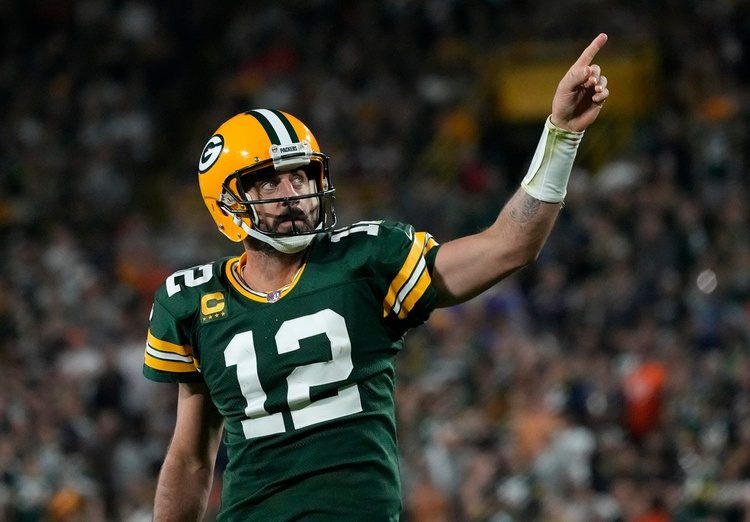
In 2019, despite a 13-3 record, Aaron Rodgers threw for a paltry 26 touchdowns and turned in a career low 62% completion percentage. His QBR and Quarterback Rating were both significantly below his standard. The grumbling was getting louder. Was the 36 year old was slipping?
“The explanation for Rodgers’ drop-off appears to be straightforward: He is a quarterback who is no longer as accurate as he used to be.” The Athletic wrote.
Then, it happened.
“With the 26th pick in the 2020 NFL draft the Green Bay Packers select Jordan Love.”
BAM. Back to back MVP seasons from 12. The year immediately following Love’s selection, Rodgers posted a career high in completion percentage and touchdowns. He was as good as he’d ever been.
Sources had indicated Rodgers’ frustration with the pick. The quarterback later confirmed the reports himself. “Once I got that text I went to the pantry, I poured myself about four fingers, and I knew it was going to be one of those nights where people were going to start calling” Rodgers said. “Like I said, I wasn’t elated by the pick especially being one game away from the Super Bowl and feeling like we’re a couple players away, but at the same time I understand it’s a business. I know that the reality.”
Aaron was frustrated. Aaron was angry. And then, Aaron was elite.
There are risks in acquiring a 40 year old Aaron Rodgers. He seems to waffle on commitment. His play, amidst a thumb injury, dropped off last season. He’s notoriously temperamental when things don’t go his way. He has a weekly, national platform where he is more than willing to air his grievances.
The Jets understand all of this. Their acquisition of Rodgers is simply a bet on the Hall of Famer’s ego.
If drafting a potential replacement led to back to back MVPs, how do you think he’ll respond to the divorce?
This situation is not unique to Rodgers or the Green Bay Packers. This type of thing happens across the league on a yearly and weekly basis. Players are released, traded, or treated in a way that causes resentment. Those players then bring those feelings to the field to prove the offenders wrong. Patrick Peterson has loved sticking it to the Arizona Cardinals every chance he gets. Adam Thielen and his wife can’t stop talking about how they feel he was treated in his last year with Minnesota. As a Panther next season, he’ll be dying to prove the team wrong.
And the Rodgers saga is nothing compared to the Favre fiasco. When trading Favre to the Jets, the Packers had to put a clause in the deal that New York could not send him to Minnesota. Favre was hell-bent on revenge and the Packers knew. But if Favre was the angry hillbilly who wanted for vigilante justice, Rodgers is the calculating ninja who is actually capable of exacting it.
This move is everything to Rodgers. An opportunity to permanently cement his narrative against any possible detraction. With the worlds eyes squarely upon him the Hall of Famer can loudly and clearly state “See! None of it was my fault!”
And let’s be clear, that is what Rodgers wants. Winning would be as much vindication as it would be accomplishment.
Tom Brady and Bill Belichick were so successful in New England that even Brady’s post Patriot success hasn’t undermined the coach or organization’s credibility. The Packers won just one title with Rodgers. They only have two championships in their three decades of Hall of Fame quarterback play. A first year Super Bowl with the Jets would, in the eyes of most, place the blame squarely on the Packers organization. It proves, in Rodger’s mind, that had they provided him with the proper support he easily could’ve done what Brady or Patrick Mahomes have done. Perhaps he’s right.
A parade in New York would make Brian Gutekunst’s decision to draft Love age worse than a hairless cat. If Love is a train wreck on top of that, Gutekunst could down as a laughing stock. And we can all picture Rodgers on The Pat McAfee Show eating up every moment of it. He wants it desperately. The Jets are gambling on that. And it’s likely, given history, a good bet to make.